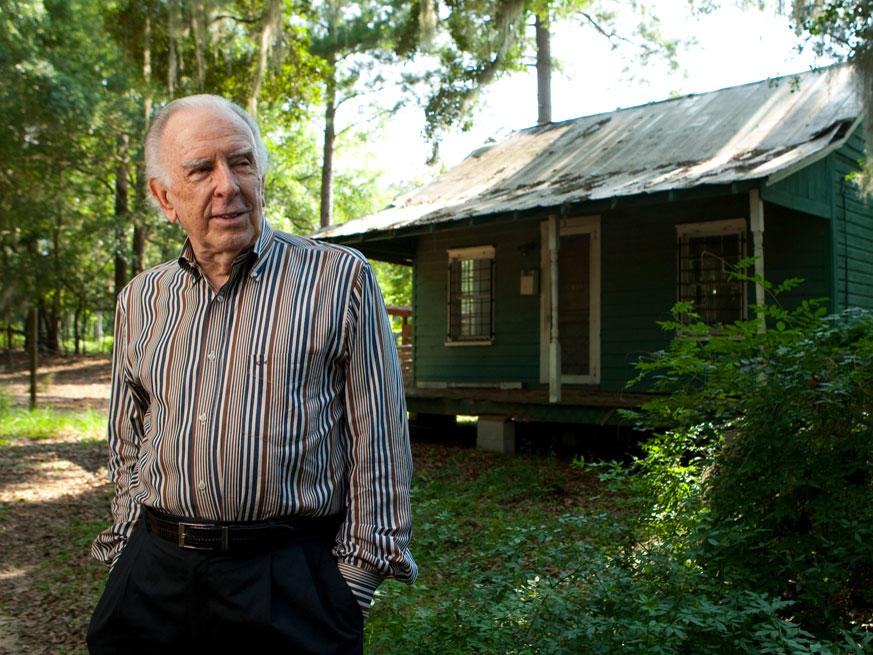Section Branding
Header Content
Carlisle Floyd, a founding father of American opera, has died at age 95
Primary Content
Composer Carlisle Floyd, widely viewed as a founding father of American opera, died Thursday at age 95 in Tallahassee, Fla. His death was announced by his publisher, Boosey & Hawkes, which did not share the cause of his death.
Floyd's operas, which numbered more than a dozen, were steeped in southern culture, examining the post Civil War South, the Great Depression and small-town life. Works such as Susannah, Of Mice and Men and Cold Sassy Tree opened opera houses to a distinctly American repertoire. He also wrote his own librettos.
Floyd was only 28 years old when Susannah debuted in Tallahassee in 1955. In college, he was a pianist and a playwright, until he began thinking about mixing his own words and music together.
"When I started out in this business, in the '40s as a kid, really, what I felt that I would love to help develop, was a serious musical theatre. Create our own musical theater for our own time and for our own audiences," he told NPR in 2000.
Susannah, set in the south and based on a Biblical story, was serious musical theatre. But the late soprano Phyllis Curtin, who created the opera's title role, said that not everyone thought so at the time.
"Carlisle's opera was largely being called, by all kinds of people, a folk opera," she told the National Endowment for the Arts in 2008. "Now why a folk opera?"
Well, maybe it was just a northern classical music establishment bias against Floyd. He grew up in South Carolina, the son of a Methodist minister. Or it might have been because Susannah includes music like the "Jaybird Song."
It sounds like a jaunty Southern folk song, but it's not. It's Carlisle Floyd's own music. The words, however, come from the composer's childhood.
"It's a bit of Southern doggerel that my grandfather used to sing to me when I was a kid, actually," Floyd recalled. "I thought it was hilarious, and I simply set it to music."
Susannah, which won the New York Music Critics Circle Award, put Floyd's name on the operatic map. It also inspired a younger generation of singers and administrators, like David Gockley, who mounted a production of the work as soon as he became the general director of Houston Grand Opera in 1972.
"Susannah convinced me that there was the opportunity to have an American opera repertoire," Gockley told NPR.
In 2000, Gockley premiered Floyd's Cold Sassy Tree, another opera set in the south. Soprano Patricia Racette sang a lead role in the world premiere. She believes singing Floyd's distinctly American operas is a gift. "Those stories are ours," she said from her home in Santa Fe, N.M. "I relish when I get a chance to be part of storytelling that is my own heritage."
Although Cold Sassy Tree is a comedy, Racette says her first substantial scene, with the haunting aria "Rented Rooms," is filled with the drama of escaping poverty.
"It has an eerie melodic quality to it that is so appropriate to what the character is saying," Racette says. "The marriage of text and music was so essential to [Floyd]. It wasn't simply underscoring the text or trying to bring it alive."
That was especially true, Curtin says, for "Ain't it a Pretty Night," the show-stopping aria from Susannah.
"'Ain't it a Pretty Night' is perhaps one of the most natural expressions of anything I ever sang," Curtin said. "It is as genuine and real for anybody in the world, I think."
The aria has been sung by countless sopranos. A few of them once gave Carlisle Floyd the compliment of a lifetime.
"I was told by some singers in New York," Floyd recalled. "They said, 'Do you know what we call 'Ain't it a Pretty Night' now? It's the soprano's national anthem.'"
All the more reason Susannah, one of the most performed operas in the U.S., could be a good candidate for the title "The Great American Opera."
Racette thinks picking just one is tricky. "If it is not the greatest American opera, it's certainly among the great American operas," she says. "He will be known as one of the great, great American composers of all time."
Floyd was given many awards during his lifetime, including a Guggenheim fellowship in 1956, the National Medal of Arts in 2004 and a National Endowment for the Arts Opera Honor in 2008.
Copyright 2021 NPR. To see more, visit https://www.npr.org.

